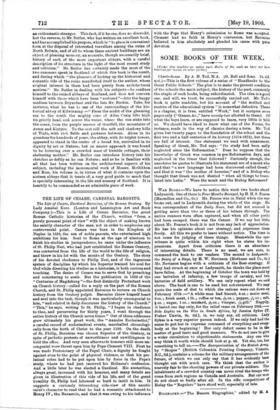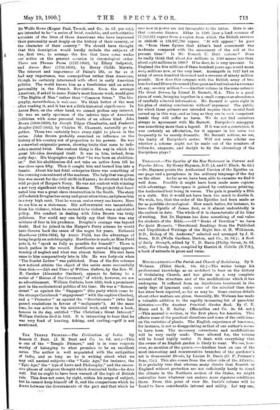BIOGRAPHY.••." The Beacon Biographies," edited by M. A
De Wolfe Howe (Kegan Paul, Trench, and Co., 2s. 6d. per vol.), are intended to be "a series of brief, readable, and authoritative accounts of the lives of those Americans who have impressed - their personality most deeply on the history of their country, or the character of their country." We should have thought that this description would hardly include the subjects of the first two, to arrange the five that have come under our' notice on the present occasion in chronological order. These are Thomas Paine (1737-1809), by Ellery Sedgwick, and Aaron Burr (1756-1836), by Henry Childs Merwin. The interest and importance of Paine's life, so far as it • -had any importance, was cosmopolitan rather than American, though he certainly intervened with effect in early American • politics. The world knows him as a freethinker and an active personality in the French Revolution. Even the average American, if asked to name Paine's most famous work, would give "The Rights of Man" rather than "Common Sense." The bio- graphy, nevertheless, is welcome. We think better of the man
• after reading it, and it has not a little historical significance. In . Aaron Burr, on the other hand, we cannot profess any interest. He was an early specimen of the inferior type of American politician with some personal traits of an odious kind. John Brown (1800-1859), by Joseph Edgar Chamberlin, and Frederick • Douglas (1817-1895), by Charles W. Chesnutt, naturally go to- gether. These two certainly have every right to places in the series. John Brown probably exercised an influence on the history of his country out of proportion to his powers. He was a somewhat enigmatic person, showing traits that seem to indi- cate a mental twist. One curious thing is the way in which his great life-idea developed itself. It was in him, indeed, from early days. His biographer says that "he was born an abolition- ist." But his abolitionism did not take an active form till he was close upon fifty. Then it caught him and turned him into a fanatic. About his last fatal enterprise there was something of the cunning concealment of the madman. The help that was given him wan meant for the civil strife in Kansas ; he diverted it to the wild project of Harper's Ferry. He was not content with winning a not very significant victory in Kansas. The project that fasci- nated him was a great slave insurrection in the South. The story of Frederick Dcuglas has many and great attractions,and places him in a very high rank. That he was an orator every one knows. Here we see him as a statesman. His self-restraint was remarkable. Even his violence, when he seemed to be violent, was a calculated policy. His conduct in dealing with John Brown was truly judicious. Nor could any one fairly say that there was any mixture of fear in his prudence. Douglas's courage was beyond doubt. Had he joined in the Harper's Ferry scheme he would have thrown back the cause of the negro for years. Nathaniel Hawthorne (1804-1864), by Annie Field, has the advantage of being largely an autobiography. Hawthorne is made, as Miss Field puts it, to "speak as fully as possible for himself." . There is much pathos in the record. Hawthorne served a long appren- ticeship of neglect and what was almost failure. His real fame came to him comparatively late in life. He was forty-six when "The Scarlet Letter" was published. None of the five volumes now noticed attains the object of the series more successfully than this.—Life and Times of William Guthrie, by the Rev. W. H. Carslaw (Alexander Gardner), appears to belong to a series of "Heroes of the Covenant," of which, however, we see no advertisement. William Guthrie, born 1620, took a prominent part in the ecclesiastical politics of his time. He was a " Remon- strant " as against the "Engagers" (the party which came to the strange Carisbrook "engagement "with the captive Charles), and a " Protester " as against the " Resolutioners " (who had passed resolutions in favour of " malignants"). At the same time, he was active in his ministerial work, and wrote a book, famous in its day, entitled "The Christian's Great Interest." William Guthrie died in 1665. It is interesting to hear that he was very fond of hunting, fishing, and curling,—golf is not mentioned.







































 Previous page
Previous page